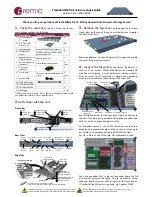10
007-6419-002
2: System Safety
ESD Precautions
Caution:
Electrostatic discharge (ESD) is generated by two objects with different electrical
charges coming into contact with each other. An electrical discharge is created to neutralize this
difference. The discharge can damage electronic components and printed circuit boards.
The following measures are generally sufficient to neutralize this difference before contact is
made to protect your equipment from ESD:
•
Use a grounded wrist strap designed to prevent static discharge.
•
Keep all components and printed circuit boards (PCBs) in their antistatic bags until ready for
use.
•
Touch a grounded metal object before removing the board from the antistatic bag.
•
Do not let components or PCBs come into contact with your clothing, which may retain a
charge even if you are wearing a wrist strap.
•
Handle a board by its edges only; do not touch its components, peripheral chips, memory
modules or contacts.
•
When handling chips or modules, avoid touching their pins.
•
Put the serverboard and peripherals back into their antistatic bags when not in use.
•
For grounding purposes, make sure your computer chassis provides excellent conductivity
between the power supply, the case, the mounting fasteners and the serverboard.
Operating Precautions
The following are two noteworthy operating precautions:
•
Ensure that the chassis cover is in place when the server is operating to ensure proper
cooling. Out-of-warranty damage to the system can occur if this practice is not strictly
followed.
•
Please handle used batteries carefully. Do not damage the battery in any way. A damaged
battery may release hazardous materials into the environment. Do not discard a used battery
in the garbage or a public landfill. Please comply with the regulations set up by your local
hazardous waste management agency to dispose of your used battery properly.
!
Summary of Contents for UV 30
Page 1: ...SGI UV 30 System User Guide 007 6419 002 ...
Page 4: ......
Page 8: ......
Page 10: ......
Page 12: ......
Page 21: ...Serverboard Features 007 6419 002 5 Figure 1 4 Serverboard Block Diagram ...
Page 33: ...Install the System into a Rack 007 6419 002 17 Figure 3 2 Installing the Inner Rails ...
Page 37: ...Check the Serverboard Setup 007 6419 002 21 Figure 3 4 Accessing the Inside of the Chassis ...
Page 49: ...Replacing a Power Supply 007 6419 002 33 Figure 5 3 Replacing a Power Supply ...
Page 51: ...Replacing Disk Drives 007 6419 002 35 Figure 5 4 Removing HDD Carrier from Chassis ...
Page 52: ...36 007 6419 002 5 Chassis Maintenance Figure 5 5 Removing Dummy Drive from Carrier ...
Page 55: ...Replacing System Fans 007 6419 002 39 Figure 5 7 System Fans ...
Page 56: ......
Page 64: ......
Page 66: ......


















